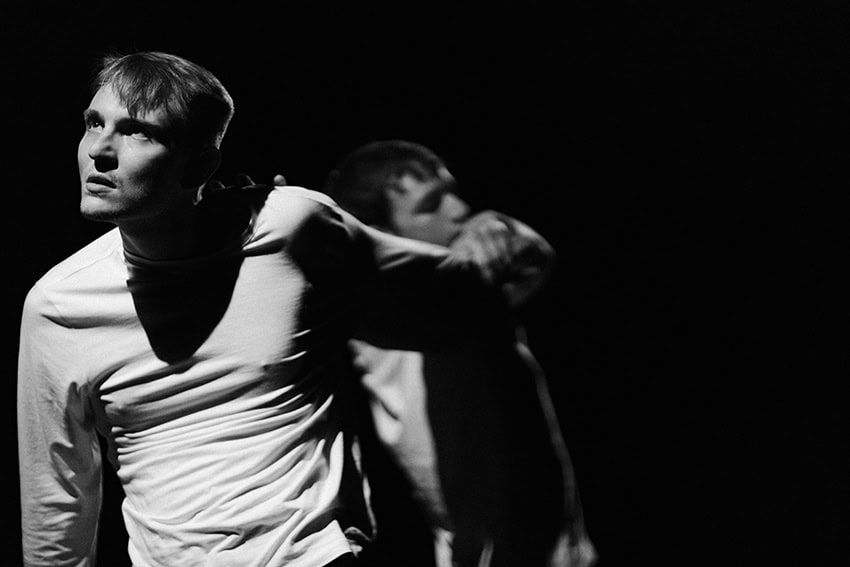Thomas Page Dances, A Moment
Posted: September 21st, 2021 | Author: Nicholas Minns | Filed under: Film, Performance | Tags: AIDS, Bren Gosling, Llewelyn Lewis, Princess Diana, Rachel Luff, Robert Singer, Thomas Page, Thomas Page Dances | Comments Off on Thomas Page Dances, A MomentThomas Page Dances, A Moment, Filmed at the Old Fire Station, Oxford, July 3

In writing the play, Moment of Grace, in 2018, Bren Gosling distilled the stories of three characters whose lives were irrevocably linked through the AIDS pandemic in the UK of the 1980s. Because Gosling was close to people affected — he dedicated the play to the memory of Shane Snape — he was able to incorporate his insights into the psychological stance of each character that allows us to better understand the socio-political environment in which they experienced the disease. The play deals with fear, loss, disgrace, shame and friendship as the scourge of AIDS began to impact the gay community through misinformation and rank prejudice and is based on a historic occasion, the opening in April 1987 by Diana, Princess of Wales, of Britain’s first dedicated AIDS unit at London Middlesex Hospital. In the version I saw, filmed in the first lockdown, Gosling mixes his script with archive video of Diana’s much mediatised visit in which she openly shook hands with nurses, doctors and one of the patients, which did much to counter the misinformation and prejudice around the spread of AIDS. The title’s ‘moment of grace’ links the defiance of Diana’s handshake with the courage of one of the consultants to admit, in conversation with the princess on live television, that he too had AIDS.
When Gosling suggested to choreographer Thomas Page that he respond to Moment of Grace, the idea was to present both his play and the choreographic response as a double bill. “I am very interested as a writer in collaboration with other creative forms. Also, I wanted to open a dialogue between older and younger generations of LGBTQ people about the English AIDS pandemic. Art is always great for opening up dialogue.”
Even though Page describes the work on his website as “two performers explor[ing| what it was to be gay in the 80s when the UK was full of fear and ignorance”, is it possible — borrowing from R.D. Laing’s The Politics of Experience — to know the experience of another, let alone the experience of another forty years ago? Art, it seems, can only make marks on a surface or in space that point to that experience while the audience is left to reconstruct those marks and pointers in their own mind, to distil an emotion of what that original experience might have been. In this sense, A Moment is very much an exploration in movement by the two performers, Page and Llewelyn Lewis, of what it is to be gay today, at a time and in a society where homosexuality is more accepted, and, thanks to antiretroviral drugs, AIDS is no longer a death threat.
The setting of a bare stage under Rachel Luff’s moody lighting and Robert Singer’s evocative score gives A Momenta sense of existing on a raised dais floating in time. An arresting image draws us down to a domestic scene in which Lewis stands centre stage, fully clothed, in an overhead cone of light, repeating the close, enveloping gestures of one taking a shower. Repetition — a choreographic motif favoured by Page — etches the image in our memory while suggesting the languor and routine of the everyday. It is only interrupted by rising side lights signalling Page’s entrance into the space, coming to rest with one foot on one of the many items of clothing scattered around. The presence of clothes responds to a line in Gosling’s play spoken by Andrew as he looks back at his life: “I used to be interested in clothes, clubs, buying records. And men. Now my life…what life?” For Andrew and others in his position the desire for gratification must have seemed so insignificant in the face of death, but for Page and Lewis the clothes seem by contrast to be casual attachments, choices to wear or abandon. Page describes the ensuing duet as ‘moving through themes of paranoia, intimacy and oppression’, but his seismic palette has few ups and downs, few moments in which transitions from one emotion to another are clearly established. To adapt daily movement to the stage as a communicative structure to relay ideas and emotions requires a choreographic vocabulary that has the clarity of language in visual form. Page’s response to Gosling’s play is more an open-ended reverie between two men that softens the contrast between the themes it purports to address, as if Gosling’s social concerns have been replaced by Page’s existential ones. It will be interesting to see the live pairing of the two, as was intended, as an indication, perhaps, of how far the present LGBTQ+ community has developed from the initial AIDS crisis and how much it owes to those who endured it.
(The two works premiered together at the 2018 Bloomsbury Festival but were transferred during lockdown to the screen, the format in which I saw them).